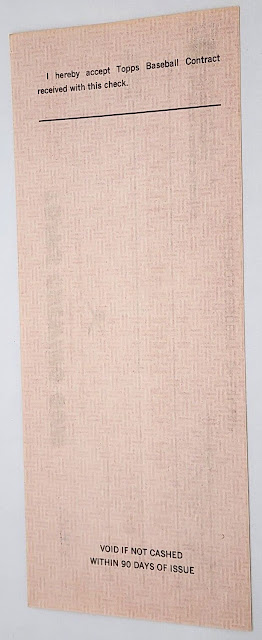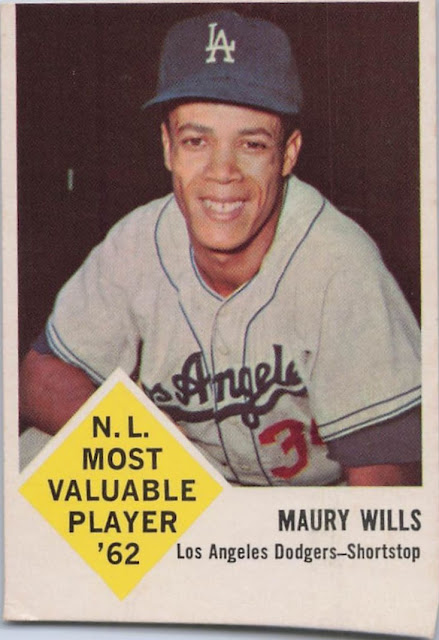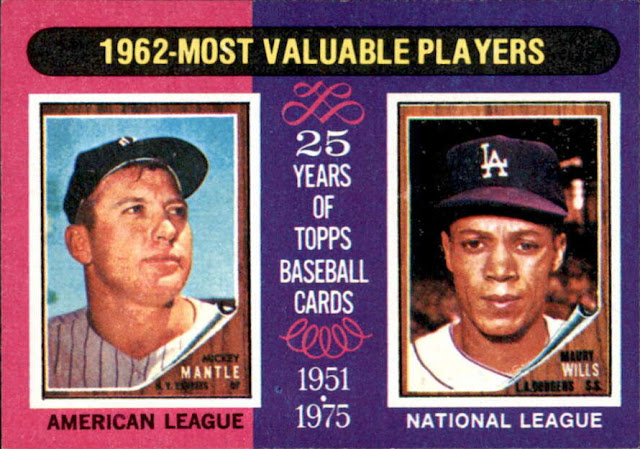If you read almost anything at all about the history of Topps and in particular Sy Berger, their one time Promotions Manager who ended up heading their Sports Department for many years, you will invariably run across the phrase "steak money." This is what Berger referred to as the initial payment to a minor leaguer who, in the eyes of Topps, had eventual major league potential. This was done in order to contractually bind the player to Topps, no small thing throughout the course of Berger's employment. This "stake" was always described as enough to allow the new signee to go buy a steak, which makes it a homonym in this context. The amount of this initial check? Five bucks!
Well, you can tell this is a tale reflecting prices from a long, long time ago as five dollar steaks at a decent restaurant haven't been priced at that level since the early 1980's (if not earlier). There is a famous story about Topps shunning Maury Wills, never offering him steak money, and the long standing grudge held by the 1962 National League MVP, who was also key member of three World Champion Dodgers teams, that led him to boycott the company until 1967. Wills is an interesting subject, who we will return to momentarily but first, why not show what these checks actually looked like.
The front is extremely precise, isn't it?!
Well it's no surprise these were pre-printed as Berger and his scouts (primarily Turk Karam until he passed in 1963) must have carried sheafs of these around with them at Spring Training every year. Just fill in the date and name and all was well! The "signature" is that of Louis Walker, a long time Topps Treasurer who also had a seat on their board. Here's our man:
The date this version of the check was used would be after 1963, when ZIP codes were implemented. The 254 36th St. address was in use for decades by Topps, starting in 1956 and I believe until they moved their corporate office out of Brooklyn and into Manhattan in the mid-1990's.
The really interesting part is on the back, where once endorsed the player was legally signed to a Topps contract, most assuredly also carried around in volume as well by the various Topps agents. I believe this check-based arrangement is referred to as a Facultative Endorsement. Yup, it was an important five bucks!
Now, back to Mr. Wills, who in 1951 broke in with the Dodgers D-Level affiliate in Hornell, New York which was in the old Pennsylvania-Ontario-New York (PONY) League. He was scrawny but was always younger than the league's average age wherever he played, at least until 1962 when he was 28 and an established major leaguer.
Wills progressed fairly quickly (albeit quite typically for the times) through the Dodgers minor league system, reaching AA-Level by 1955 then stalled out, with a demotion to A-Ball in 1956 following a subpar season. I originally guessed 1956 or maybe 1957 was the year of the snub as Bowman was snapped up by Topps in early '56 when Wills was actively descending the minor league ladder. In fact, he played with Cincinnati's PCL affiliate in Seattle for the 1957 season after they selected his contract from Brooklyn in the annual Rule 5 draft. The Reds sent him back to the Dodgers (with a brief stop elsewhere) in 1958 and he played for Spokane in the PCL until he was called up in the middle of the 1959 season to Los Angeles and sparked the Dodgers down the stretch, even garnering some down ballot MVP votes.
What actually happened though, according to a 2011 article in the Los Angeles Times, was that the "brief stop elsewhere" was due to Wills being given an opportunity to try out for the Tigers during Spring Training in 1959, on the condition of being returned to the Dodgers if he failed, which he did. Topps had Turk Karam scouting the Tigers camp as this was happening and he passed on Wills after being told by several Tigers staffers that Maury would never play in the bigs. He was sent packing back to the Dodgers organization where his manager in Spokane (Bobby Bragan) turned him into a switch hitter with almost instantaneous results and basically, Wills never looked back. When Dodgers shortstop Don Zimmer got hurt, Maury was called up and that, as they say, was that. He literally went from zero to hero in one magical season as the Dodgers took the Fall Classic in six from the Go-Go Sox.
The lack of a Topps contract didn't stop Wills from appearing in numerous sets before 1967. In addition to several regionals, he was a Fleer subject in their 1963 set, where his rookie card is one of the highlights in a fairly mundane issue and notes his prior season's MVP honors. He also was featured in couple of Exhibit sets.
Looks like he was in a bottom row for Fleer in '63 if this example is anything to go by:
Topps bought Fleer's baseball contracts out in 1966 after, I believe, the Major League Baseball Players Association under Marvin Miller tried to offer the the latter exclusive baseball card rights for several seasons for a fee of $600,000. This seems to have occurred after Topps appealed a reversal of the sole count they were dinged with in a Federal Trade Commission complaint brought by Fleer several years earlier. It's thought by some that their 1963 set was halted not by a Topps lawsuit but rather poor sales, so Fleer looks like they wanted no part of the market going forward, at least until a decade later.
Wills seems like he was just had his contractual rights assumed by Topps and appeared in their sets from 1967 until he retired following the 1972 season. His 1967 Topps card is a nice one:
Some revisionist history occurred in the 1975 Topps set, where the MVP subset required the use of a player's card from their award-winning season, which led to this:
Topps also used that ersatz '62 Wills card when they prepared a set for K-Mart in 1982. Prior to that, they offered a mea culpa of sorts in their 1977 set with this card:
Ironic, eh?








1 comment:
The Manufacturers Hanover Trust Company officially came in existence on September 8, 1961, the day Mickey Mantle hit his 52nd homerun (in the 1961 season)
52 Mantle
Post a Comment